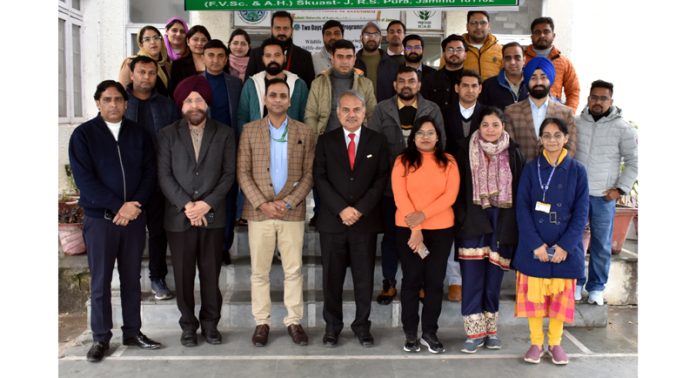Excelsior Correspondent
JAMMU, Feb 20: Sher-e-Kashmir University of Agricultural Sciences and Technology of Jammu (SKUAST-J) conducted a groundbreaking two-day training program on wildlife health monitoring.
Veterinary Doctors from Animal Husbandry, Sheep Husbandry, Zoo veterinarians post graduate scholars participated in the programme. Expert lectures were delivered by the distinguished scientists from USA, Central University and Wildlife Institute of India.
The event, under the guidance of SKUAST-J Vice-Chancellor, Prof B N Tripathi, was graced by the presence of the Dean, FVSc & AH, marks a significant initiative to sensitize and set the tone for future wildlife health monitoring at the wildlife-domestic interface in Jammu and Kashmir.
Vice-Chancellor, Prof Tripathi B N lauded the university’s initiative, making it the first of its kind in Jammu and Kashmir to sensitize and set the tone for future wildlife health monitoring.
Dr Kafil Hussain, Organizing Secretary, underlined the significance of the training program for wildlife health monitoring in the region.
Prof Rajiv Singh, Head of the Medicine Division, provided insights into critical aspects of wildlife health, reinforcing the importance of collaborative efforts in the field.
Director of the Ministry of Environment, Forest and Climate Change, Jammu Division, and a special video message from Dr Benji Alacanter, Head Veterinarian at Wildlife Safari, Oregon, USA, added an international perspective to the discussions.
Dean, Dr Rajesh Katoch, said that wildlife suffers from various diseases, which can spread from domestic animals to wild animals and vice-versa. Besides this, he added, wildlife is a source of infection for human population and many a times the disease may occur with enhanced virulence as in case of avian influenza and rabies which are zoonotic diseases of high-risk categories.
Abha Tikoo, Associate Professor, concluded the event with a vote of thanks


